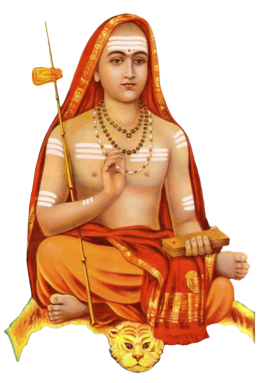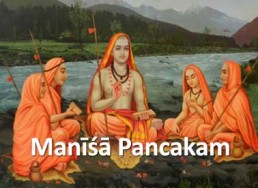Manisha Panchakam
A short five-verse composition by Adi Sankaracharya

Manisha Panchakam
In Sanskrit, the word ‘Manishā’ means conclusive wisdom or determinate knowledge. Such knowledge does not arise merely due to some faith or based on dogmatic principles or emotional attachments but is born out of intellectual discrimination. It is resolute and completely free of any doubt. The word ‘Panchakam’ refers to that which is contained in five. So Adi Sankara’s ‘Manisha Panchakam’ refers to the conclusive wisdom or determinate knowledge asserted in five verses. What is Sankara’s assertion as his determinate knowledge? What is such conclusive wisdom?
‘The Atman, the immutable energy present within me and in every life is none other than the Paramatman, the pervasive, omnipresent energy, embedded as a thread within all lives and seated as the witness to everything. Whoever has this knowledge and remains steadfast in that wisdom of non-duality, he alone, irrespective of his stature in the world due to the caste, creed or societal classifications, is the real preceptor and Guru, worthy of worship even by the gods.’
The story behind Manisha Panchakam
Manisha Panchakam Verses - In Sanskrit and English with Meaning and Commentary
MP – Intro 1-Annamayādannamaya
MP – Intro 2-Kim gaṃgāmbudhi
MP – 1-Jāgratsvapnasuṣuptiṣu
MP – 2-Brahmaivāhamidaṃ
MP – 3-Śaśvannaśvarameva
MP – 4-Yā tiryaṅnaradevatā
MP – 5-Yatsaukhyāmbudhileśaleśata
MP – Closing -Iti śrīmatparamahaṃsa
Story behind Manisha Panchakam
This Prakarana text is pivotal to assess Shankara’s approach and attitude to social issues, and their interface with his Advaitic philosophy. In essence, what the Manishapanchakam establishes is that Shankara, in asserting that Brahman alone exists, and all else is subordinate or illusionary, devalued man-made social distinctions such as those of caste. For a person who has understood the reality of Brahman, human labels of ‘lower’ or ‘upper caste have no relevance.
This work, it is believed, was composed when Shankara was residing in Kashi. According to legend, one day Shankara, while on his way to the temple, came across a person of the lowest caste (chandala). Since ‘lower castes’ were supposed to socially ‘defile’ those of higher castes, the chandala was asked to move out of the way. But, the chandala instead asked Shankara how can there be any social discrimination when all human beings, and, indeed, the entire universe, is nothing but the reflection of Brahman, the one
and only real.
When confronted with this question, Shankara is believed to have recited the Manishapanchakam. The significant point is that each verse ends by reiterating Shankara’s ‘firm conviction’ that, for a person who has attained self-knowledge, there is no relevance of social hierarchies. Sociologists will quibble whether the Manishapanchakam is enough to establish Shankara’s disdain of the caste system and other upper caste orthodoxies, but this text is certainly emphatic in demonstrating his philosophical egalitarianism. In any case, it is noteworthy that, in a period of deeply entrenched social orthodoxies and discrimination, Shankara, in conformity with the logical inference of the Advaita doctrine, had the courage to publicly articulate his views to the contrary. – Pavan K Varma (Author of Adi Shankaracharya)


